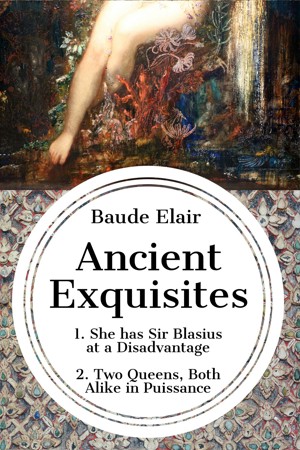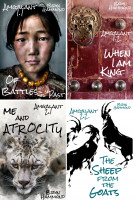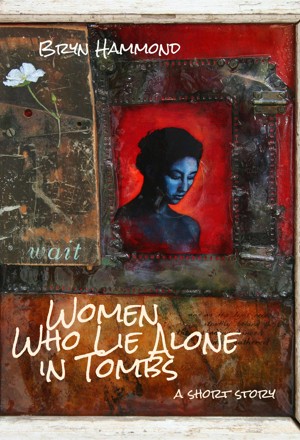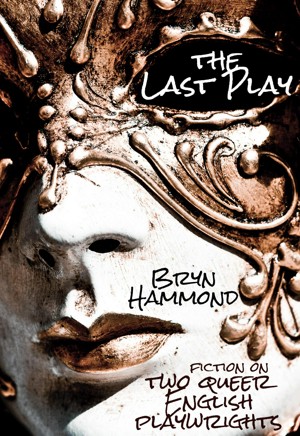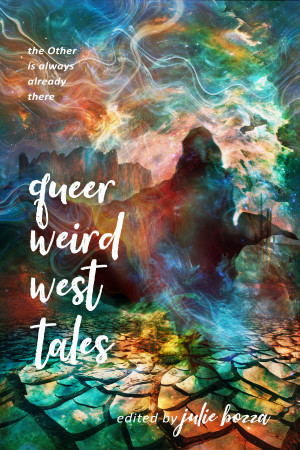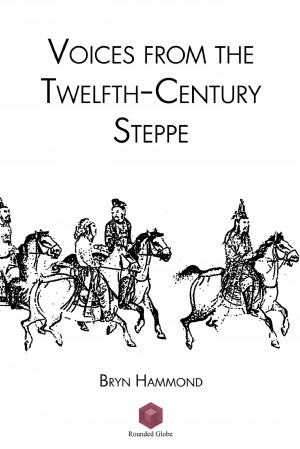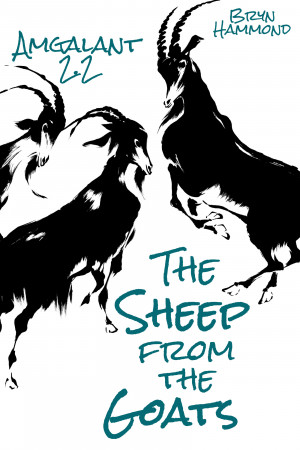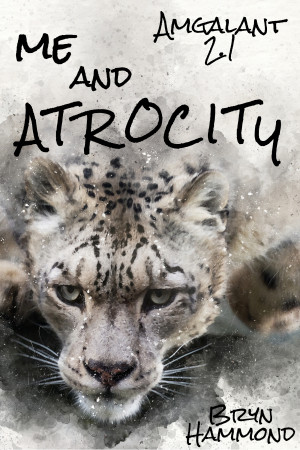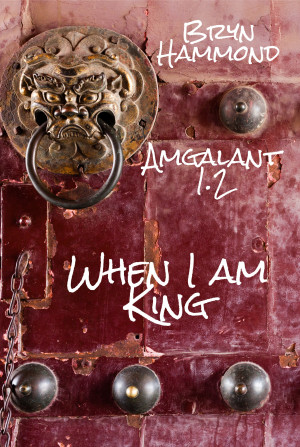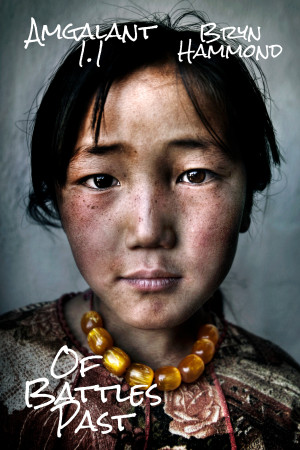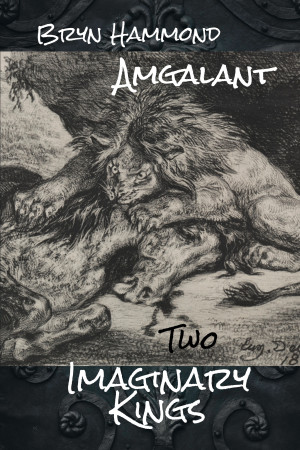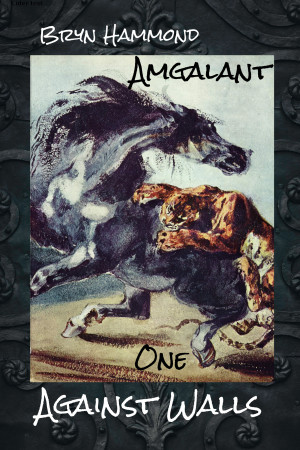Location: Australia
Member Since:
Dec. 29, 2011
4 readers have added this author as a 'Favorite Author'.
Bryn Hammond
Publisher info
Writer, Australia, ex-UK.
I've been quietly at work on my historical fiction about 12th and 13th-century Mongols since 2003. It's my main occupation/obsession.
Before that, I spent years on a creative translation of Beowulf (unfinished) and wrote science fiction.
Keen on: walks by the sea, where I live. Baroque opera, Shostakovich, David Bowie. Books, old and a few new. Doctor Who and Star Trek: Discovery.
I've been quietly at work on my historical fiction about 12th and 13th-century Mongols since 2003. It's my main occupation/obsession.
Before that, I spent years on a creative translation of Beowulf (unfinished) and wrote science fiction.
Keen on: walks by the sea, where I live. Baroque opera, Shostakovich, David Bowie. Books, old and a few new. Doctor Who and Star Trek: Discovery.
Where to find Bryn Hammond online
Website: http://amgalant.com/
Twitter: @Jakujin
Facebook: Facebook profile
Blog: http://amgalant.com/
Twitter: @Jakujin
Facebook: Facebook profile
Blog: http://amgalant.com/
Where to buy in print
Ancient Exquisites
by Baude Elair
Price:
$2.99 USD.
Words: 4,780.
Language:
English.
Published: August 28, 2021
by
Bryn Hammond.
Categories:
Fiction » Historical » Medieval, Fiction » Romance » Historical » Ancient World
Lushly-written short fiction set in imaginary pasts. Independent women who like to yield. Two tales, both ways.
1. She has Sir Blasius at a Disadvantage
2. Two Queens, Both Alike in Puissance
Series
Amgalant four-set
by Bryn Hammond
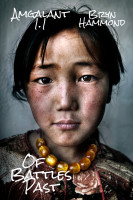 Of Battles Past (Amgalant 1.1)
Of Battles Past (Amgalant 1.1)
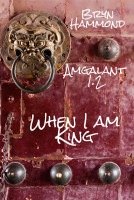 When I Am King (Amgalant 1.2)
When I Am King (Amgalant 1.2)
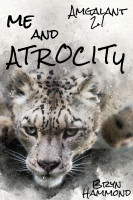 Me and Atrocity (Amgalant 2.1)
Me and Atrocity (Amgalant 2.1)
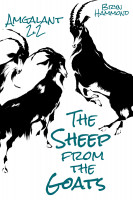 The Sheep From the Goats (Amgalant 2.2)
The Sheep From the Goats (Amgalant 2.2)
Both epic and intimate, Amgalant explores the story found in the Secret History of the Mongols. Much of this source is still secret -- neglected in Western accounts. People who knew Temujin gathered their stories into a communal memoir, which even conserves Temujin's own words. This is the inside story.
'In a word, the writing is extraordinary... To humanize one of history's most infamous conquerors is not an enviable task.'
'Hammond's writing is rich, nuanced, humorous... Amgalant is a rare and different, wonderful read.'
If you like the historical fiction of Hilary Mantel, Mary Renault or Dorothy Dunnett, the Amgalant series is for you.
 Of Battles Past (Amgalant 1.1)
Of Battles Past (Amgalant 1.1)
Price:
$4.99 USD.
 When I Am King (Amgalant 1.2)
When I Am King (Amgalant 1.2)
Price:
$4.99 USD.
 Me and Atrocity (Amgalant 2.1)
Me and Atrocity (Amgalant 2.1)
Price:
$4.99 USD.
 The Sheep From the Goats (Amgalant 2.2)
The Sheep From the Goats (Amgalant 2.2)
Price:
$4.99 USD.
Amgalant
by Bryn Hammond
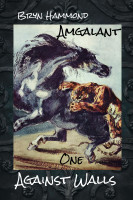 Against Walls
Against Walls
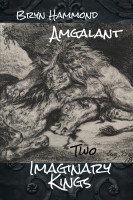 Imaginary Kings
Imaginary Kings
Series description:
'Amgalant' means unity.
This story is about the unification of the steppe under Tchingis Khan. From the shattered condition of the Mongols before him, to 1206 when Tchingis is acknowledged khan over the peoples of the steppe.
Amgalant likewise follows Temujin, the boy who becomes Tchingis Khan, from an outcast life of poverty to the achievement of his dreams.
The forty years from 1166 to 1206 saw great drama on the steppe, although settled societies off the steppe scarcely noticed. That remains true to this day. Temujin's rise to instatement as Tchingis Khan is the heart and guts of the Secret History of the Mongols, more important to its Mongol creators and audience than the off-steppe conquests afterwards.
The Secret History of the Mongols is a gorgeous source for a novelist, rich in human interest and incident. Amgalant follows this source with humble fidelity and faith in the art of the original.
 Against Walls
Against Walls
Price:
$7.99 USD.
 Imaginary Kings
Imaginary Kings
Price:
$8.99 USD.
Books
Women Who Lie Alone in Tombs
by Bryn Hammond
Price:
$1.80 USD.
Words: 5,390.
Language:
English.
Published: April 8, 2024
.
Categories:
Fiction » Historical » Medieval
After a failed insurrection, Ixin follows her lady Ai Jaruq to a Mongol queen's court, to join in a wider revolt. In the lost Khitan kingdom, there were women who found space to live unwed: the 'women who lie alone in tombs'. Is that what Ixin wants, or can she strike out on a new type of life altogether?
The Last Play: Fiction on Two Queer English Playwrights
by Bryn Hammond
Price:
$1.80 USD.
Words: 10,750.
Language:
English.
Published: February 19, 2023
.
Categories:
Fiction » Biographical, Fiction » Historical » Renaissance
After the personal debacle of publication of his Sonnets, Shakespeare has been out of sorts – and his late plays haven’t been up to standard, either. It’s time to leave London and the stage, but he still has a statement he wants spoken in public – if he dares. When a playwright needs to talk himself into courage, how else than to talk to his own creation: Emilia the Amazon in a dumpy London room?
Queer Weird West Tales
by Julie Bozza (editor), Dannye Chase, Roy Gray, Bryn Hammond, Narrelle M. Harris, Justin Warren Jackson, Catherine Lundoff, Angus McIntyre, Eleanor Musgrove, Lauren Scharhag, & Dawn Vogel
Price:
$5.99 USD.
Words: 115,900.
Language:
English.
Published: August 31, 2022
.
Categories:
Fiction » Anthologies » Short stories - multi-author, Fiction » Western
Frontiers have always attracted the Other - where they find that the Other is always already there. These 22 stories explore what happens when queer characters encounter weirdness on the edge of the worlds they know.
Voices From the Twelfth-Century Steppe
by Bryn Hammond
Price:
$2.99 USD.
Words: 23,390.
Language:
British English.
Published: April 16, 2017
.
Categories:
Nonfiction » History » Historiography, Nonfiction » Biography » Historical biography
A historical novelist explores the Secret History of the Mongols.
If the Secret History is a communal memoir, who told its secrets? Did Temujin -- Chinggis Khan -- tell his own story?
Voices from the Twelfth-Century Steppe is a case study in close source work by a creative writer. Entangled with this, a case is made for arts criticism of the Secret History. Its artistry is integral to its sense.
The Sheep From the Goats (Amgalant 2.2)
by Bryn Hammond
Series: Amgalant four-set.
Price:
$4.99 USD.
Words: 161,340.
Language:
British English.
Published: September 12, 2012
.
Categories:
Fiction » Historical » Medieval
Is he Saint Tchingis? Has he grown a monster? Perceptions differ. From the arse end of the steppe, out of nowhere, now he towers over other kings.
Me and Atrocity (Amgalant 2.1)
by Bryn Hammond
Series: Amgalant four-set.
Price:
$4.99 USD.
Words: 81,670.
Language:
British English.
Published: September 12, 2012
.
Categories:
Fiction » Historical » Medieval
‘Jamuqa had witnessed, aged fifteen, his tribe strung up on trees. Perhaps you have to go one further.’ Jamuqa is mad, and commits an atrocity in challenge of Temujin.
When I Am King (Amgalant 1.2)
by Bryn Hammond
Series: Amgalant four-set.
Price:
$4.99 USD.
Words: 101,110.
Language:
English.
Published: September 9, 2012
.
Categories:
Fiction » Historical » Medieval
“Imagine you had a prophecy you’re the advent of the Promised One, the Right Guide and the Champion of Light. You’d believe that, right? And if you didn’t, you’d love to meet people who do.”
Temujin has an awkward time with the prophecy about him and he’s happy to remain unknown. However, war and politics rudely intrude.
Of Battles Past (Amgalant 1.1)
by Bryn Hammond
Series: Amgalant four-set.
Price:
$4.99 USD.
Words: 108,150.
Language:
British English.
Published: September 9, 2012
.
Categories:
Fiction » Historical » Medieval, Fiction » Literature » Literary
The Mongols are a people of orphans. A disastrous battle with China has left wives without husbands, children without fathers. Temujin is one of these children, impoverished by the heavy tribute China has punished them with, in danger of forgetting what a Mongol stands for. Worse, Temujin's the subject of a prophecy: that he is to fight that terrible battle over again, this time with victory.
Imaginary Kings
by Bryn Hammond
Series: Amgalant, Book 2.
Price:
$8.99 USD.
Words: 240,860.
Language:
English.
Published: April 26, 2012
.
Categories:
Fiction » Historical » Medieval
(5.00 from 2 reviews)
In the steppes of High Asia, the year 1188…
Aged twenty, Temujin has been named Tchingis, khan over the Mongols. But only a third of his people accept a kingship based on dreams and omens. His own sworn brother Jamuqa challenges his title, and comes in the guise of a mock king against him.
Are dreams and omens enough to unify the peoples of the steppe? What makes a true king?
Against Walls
by Bryn Hammond
Series: Amgalant, Book 1.
Price:
$7.99 USD.
Words: 207,830.
Language:
British English.
Published: January 19, 2012
.
Categories:
Fiction » Historical » Medieval, Fiction » Biographical
(4.60 from 5 reviews)
In the steppes of High Asia, the year 1166…
‘What is a Mongol? – As free as the geese in the air, as in unison. The flights of the geese promise us we don’t give up independence, to unite.’
The hundred tribes of the Mongols have come together with one aim: to push back against the walls that have crept onto the steppe – farther than China has ever extended its walls before.
Bryn Hammond's tag cloud
19th century
ancient
asia
asia fantasy
asian history
asian novels
bisexual
central asia
chinggis
elizabethan
epic
fantasy
freedom
gay
genghis
genghis khan
historical
historical fiction
historiography
horror
immersive
inner asia
interpretation
jacobean
khan
knights
lesbian
lgbt
lgbtq
medieval
middle ages
mongol
mongolia
mongols
nomads
older women
poet
poetry
primary source
queer
romance
science fiction
shakespeare
shakespeares sonnets
soft bondage
sonnets
speculative fiction
steppe
steppes
supernatural
temujin
thomas lovell beddoes
trans
women leaders
women warriors
worldbuilding
writing
Bryn Hammond's favorite authors on Smashwords
Smashwords book reviews by Bryn Hammond
-
Promised Valley Rebellion
on Jan. 21, 2012
I'm fascinated by prehistoric fiction, but haven't found much I'm happy with... so glad to come across this set of novels. What I liked: the characters are fully human, intelligent, with attitudes we recognise, either to go along with or argue with. Stories set in the distant past can assume people were dumber than us, which is unscientific I believe. The characters are engaging, I like and admire our young hero, who's a bit of a fighter for free speech and rights; and the crisis situation turns out to be a sort of conflict of nobility on both sides. I hope that isn't a spoiler. The end is heart-warming. I like the portrait of war, people's attitudes to war (again, we can assume people of the distant past were savage bloodthirsty idiots). I like the shamans - they're called tellers here - and their way of life, distinct from the community. And I like the pitting of hunter-gatherers against early farmers: the issues, the prejudices each has against the other. There are questions also of kingship and what tyranny is and isn't; and questions on religion and the gods. It's an examination of these matters, through a story that's strong and easy to get involved in. Best, we don't have to leave the world: there's a sequel and more to come.
-
Litany
on March 08, 2012
What jolted me awake on the first page was the prose and the character-depth; then Rose won me over and I had to read to the end. The prose is often more ordinary, and at times her experiments, for me, went wrong; but she can write. Rose is a mad old lady. Not mad in the intellect, as she tells herself once almost for sure - it's her emotions that have gone mad (in a lesser way this has happened to me and I made that distinction). Still, she's crazed; she abandons her house with its memories, she packs a bag and there she is, a bag lady. When we meet her she can't stand to sleep indoors. Because the inside of her head is a rant she rants at other people; she's rude even to the sympathetic, and the writer tells you intimately why. I think Sophie the librarian is meant to be conventional in every respect, except that she fell in love with Barbara: this gives her a little practice and the ability, later on, to question and defy other conventions. It's a chisel to open her mind - just a crack at first - rather as E.M. Forster designed the character of Maurice. Sophie's grief for dead Barbara, and the fact she cannot even tell her workmates she's in grief, are terrible for us to experience. I ought to warn you about the tragedy in the book. Zak, a fourteen-year-old girl, didn't convince me the way the others did, and Rose remained the most original. These three, two women and a girl, are thrown together, and the book's about what comes of that. The setting is Chicago 1968. On every street corner there's a prejudice: black/white; we're in a Polish neighbourhood, with much on when and how you use Polish, use English; the homeless; Sophie who doesn't call herself a lesbian; the hippy guys' treatment of the hippy girls is woeful. Then there are the humane, like Jake who gently and most steadfastly stands up to officialdom and the police, as only the runner of a soup kitchen knows how; and of course Rose.
-
Scar
on April 03, 2012
Too wonderful, I don't know how to talk about it. The spiritual insights of schizophrenia; Irish legends earthily told; artistry, of the sort that only needs a sentence or two, to make you look twice. I have to read this again. I feel inadequate to comment. - Not that you can't gain much, much, on a single and even fast read; the story hastens you along.
-
Not Wisely but Too Well
on Feb. 07, 2013
I loved this. It worked on me, in that funny way you can’t define or account for: I believed in this young Shakespeare, and feel I’ve spent a few days in his presence, with the intimacy of those eyes of his on the cover. And I’m reluctant about first person, which often doesn’t do its job for me, doesn’t bring me close. Not that this is a huge character-study; it’s just a realistic Shakespeare in whom I believed. I’ve surprised myself with this. I’m keen on Sh, the works, but I haven’t read biography - what biography? I always think – and I haven’t tried biographical fiction, either. I detested the film Shakespeare In Love (possibly unfairly, and I remember nothing). It’s since I read the Sonnets this year that I have a sense of Shakespeare the person, and an interest, I guess, in the very life-issues that come up here, so no wonder I loved the novel. To my mind, the Sh who wrote the Sonnets was gay or mostly gay – to use our terminology – and that’s that. Those who don’t like it... say the Sonnets aren’t evidence. But how on earth do you write and publish such sonnets in the social context? This novel treats of Marlowe – what on earth he meant to do, or say, when he wrote Edward II for the public stage. It starts to answer questions that I had, and in the novel, alongside Marlowe, Shakespeare is a lover of men. In the novel their names are written Christofer Marley and Will Shakspere. Because that’s how they were known or written in these early days. And that leads me to talk about the flavour of authenticity you get here. There is enough ‘thou dost’ to have a feel of the old language, but not enough to be in the least difficult. For me, that balance is just right. I like how she sets out speech as in a play - in Shakspere's hand, for this is a novel of letters. There’s a level of detail that may, in patches, be dull. For instance, I skipped over finances, as I have a severely unfinancial brain. But I’ll take this detail, any day and every day (with reader’s discretion to skip) in order to build up a realism. Which it does. Realism, too, was what I thought in the story of his marriage to Anne Hathaway. It might have happened exactly like this, only too easily. His family life, or lack of, isn’t made into what it wasn’t but seen for what it more than likely was. In short I admired the honesty, against the temptation to romanticise. Of course he must have had a heart’s commitment. Why? Because he’s Shakespeare, and he wrote what he wrote. The author has speculated on who the focus of his love life is (I won’t tell you, because she hasn’t in the blurb) and that makes for great story – again, I’d say, without too much romance. There’s no explicit sex. Much else is covered. Theatre life, the politics of theatre, religious conflict. It was a dangerous time for playwrights; Kyd’s put on the rack; other known names sell their quills to dirty politics, or whatever. Our lad Shakspere isn’t as out-there bold or contentious as Marley (we knew that) but he’s on the humane side of every question or controversy (we knew that too). The frame, where an academic finds his letters, didn’t win me, there at the start; it’s a device, and the novel doesn’t need a device. I even felt I’d have happily dispensed with the letter set-up; I’d take first person Shakespeare without explanation or excuse; but I can see it serves a function. I got well lost amongst Richards, Johns and Ellens; too frequently I had no idea who these people were. That might be my fault, as I opened this book in casual curiosity, and didn't pay due attention until I discovered I'd love it. I'll follow, eagerly, into the next instalments of Stuff of Dreams.
-
Arauco: A Novel
on June 23, 2013
A fabulous shaggy beast of an epic novel. I was won when Juan sets out on life under the influence of the romances of chivalry that turned Don Quixote’s brains – Amadis of Gaul, Orlando Furioso. Hey, I love those books myself; I’m glad they get a look-in as the culture of the times, even if, inevitably, their function is to contrast with the reality. Yes, as in Don Quixote. Still, I liked to have an innocent, idealistic main, on the Spanish side, but if you want more earthy sorts, there’s no shortage of them – beginning with Pedro, the aging swashbuckler who takes Juan to his garishly-costumed bosom. Then on the Mapuche side I had Namku, a shaman of his people. He’s a shaman because he’s strange – an albino – and ‘weye’ too, that is, of the sexuality that was worse than the worst sin and blasphemy to the Spanish of the time. I rarely, or make that never since I can’t name any – see shamans that step from the pages of anthropology, not vaguely made up but as they exist/existed within their cultures. In himself Namku was worth three anthropology texts on the subject. Along with that I liked him and his story, and Lleflai, another outcast due to her face being melted in a fire, just to start on the large cast of Mapuche. It’s often the case that the more familiar side, the European, gets a more catchy story, but not the case here: the Mapuche story is every bit as thoroughly invented. I’ve only talked about what snared my interest, because I read chivalric romances and anthropology on tribes. As I say, though, it’s a epic, that means ample, inclusive, and you’ll find quite other things of interest. I’d better attempt general comments. In spite of the hideous events of the Spanish invasion, he gives you the opportunity to enjoy the high adventure the Spaniards thought it. As they swashbuckle their way into Chile and crack the grim/gallows jokes known to war, that you have to find hilarious at the time. Importantly, too, for me, there’s a kindness behind the whole. When we have Mendoza dogging natives, I need to be in a kind hand – that’s the author’s. There are nail-biting moments – a few when Mendoza’s off dogging – and don’t miss the Mapuche ball game that’s as thrilling as a battle. I was often glued to the page, and if I snoozed in Mapuche language lessons, that’s fine and right, that, to me, is epic – a word I don’t use in the debased sense. It’s written with wit and charm and frequent humour, which qualities endear a book to me. Deserves a second read – there’s so much here.


